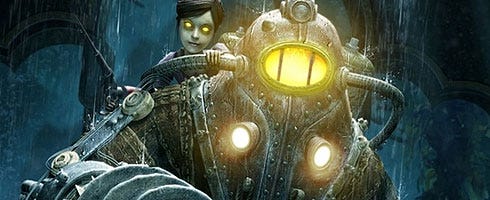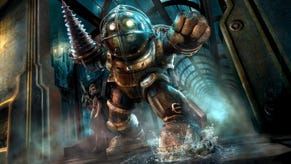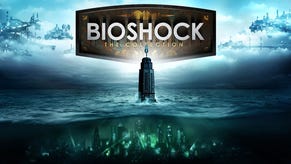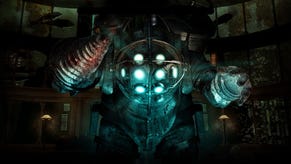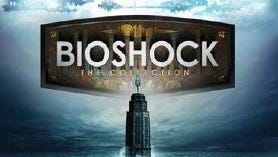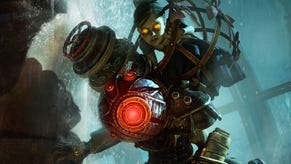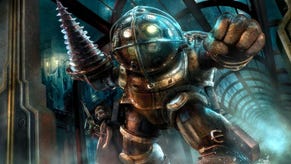BioShock 2: Jordan Thomas on rediscovering Rapture
All text by Simon Parkin.
There’s a lot at stake for Jordan Thomas, Creative Director of BioShock 2. As a man best known, not for designing famous games, but for designing famous levels (specifically, BioShock’s brilliant Fort Frolic and Thief: Deadly Shadows’ similarly standout Shalebridge Cradle) the keys to Rapture must have felt particularly heavy when 2K handed them over. Not only that, but the publisher tasked Thomas with creating his very own studio, 2K Marin, to make the sequel. So not only is this a game through which he must prove himself able to deliver a cohesive vision over a full game experience, but also his ability to handpick a talented team to deliver it is on test.
Add to this the pressure of maintaining the integrity of Ken Levine’s vision as laid out in the original game, not to mention that of answering its many critics, it's no wonder the man looks a little tired as we sit down for a chat on a December Friday afternoon. But with just a few months left till release, there’s perhaps no better time to reflect on the development so far, and look ahead to its conclusion. As ever, Thomas rises gracefully to the challenge.
VG247: BioShock could be described as Ken Levine’s magnum opus. Do you feel the same way about this game? Do you intend BioShock 2 to be your primary legacy to the medium?
I agree that BioShock was Ken’s magnum opus in the sense of it being the culmination of years of experience with this particular kind of game. And I have immense respect for the game world and mythology, my own input into the first game and, by extension, the whole of the 2K Boston team. But having said all of that, I definitely don’t feel like BioShock 2 will be my primary legacy.
What sort of relationship do you have with the game then?
I see my job as creative director to essentially take this world that has been crafted with a lot of love, and to treat it with respect while simultaneously extending it meaningfully. That translates, I think, to offering players some new surprises that maybe could only come from two different creative minds working on a game world.
I’m extremely mindful that whatever I want to do with BioShock should never compromise the Rapture tone, which is so very specific and defined, nor indeed corrupt the world’s integrity. Those have been my primary challenges while working on the game, without even considering what legacy the game might leave for me.
What did you identify as the weakest elements to BioShock and how have you sought to address those issues?
In terms of weaknesses in the original game?
Yeah.
I guess there were a couple of things. First there seemed to be a strong kind of sub-textual payload that’s related to the medium. In the conclusion of Act 2 moving into Act 3 I think a lot of people who were paying attention were craving an interactive change at that point in the narrative, perhaps hoping that they could start making decisions that would shape their destiny in reflection of the protagonist’s journey to freedom. That didn't happen. So I very much wanted that exact shift to occur at the beginning of BioShock 2; for the player to realise that this has become a shooter where free will is a major component that defines who Subject Delta is.
Beyond that, while I was extremely impressed by the more general combat systems in the first game, not all of the features were as mature as in comparable shooters. There were things lacking that are just kind of expected of reasonably rational agents running around in a firefight these days. For example, now in Bio Shock 2 the Splicers are cover-aware at multiple heights and they can jump between different surfaces in order to try and get the drop on you. Enemies can pick things up and throw them at you, and this is all in addition to being aware of, for example, how water can be used to extinguish fire and the like.
Some enemies are now able to perch on the wall and then land on your face unbeknownst to you. That kind of stuff really adds variety to the tactical bubble that the player stumbles through and I guess for me, the variety of these AI capabilities goes a long way towards enriching the experience over time. In the first game there was a reasonable but smallish variety of Splicers, but by its conclusion we were kind of recycling those. That's definitely not the case in BioShock 2 where you face a pretty wide array of different enemies over the full course of the experience.
You’ve talked a lot about how this is a game about free will. How much freedom does the player have to behave in ethically diverse ways in the game?
You know, the character in that big badass diving suit is as much a cipher for me as he is to himself. Part of the reason that I chose a Big Daddy as the protagonist is because I think the player is a dynamic compositional element, meaning if it were a 2D piece of art he would be the white space and you have no idea what shape it is. So the philosophical side of it is something that you pick your position and the narrative unfolds around it.
Now, as far as how that works, you have more dials and levers in Bio Shock 2. The Little Sisters are a part of it, in that you now have a far broader range of moral choices in your dealings with them. How you treat the adoption mechanic (whereby you can choose to adopt or harvest and Little Sisters you save) is similar to the one found in the first game but informed by the forced father bond that the two of you share.
Beyond that, the sort of grey moral characters in the game are often un-spliced, meaning they can each represent some aspect of human morality. There are far more face-to-face meetings between your character and neutral third parties in BioShock 2 and, while you are drawn into conflict with them one way or another, you’re always given the opportunity to cast judgement on them at the conclusion of their ‘module’. The way you choose to deal with these discrete stories tells me a little bit more about yourself as a player, about who the hell is inside the suit. Does he have nipple piercings? Is his hair pink? By the end of the game those inputs lead to more and hopefully more tailored outputs than the first game supported.
And how does that knowledge effect the game’s outcome?
[Laughs] That twist is so important there’s no way I’m going to talk about it beforehand.
